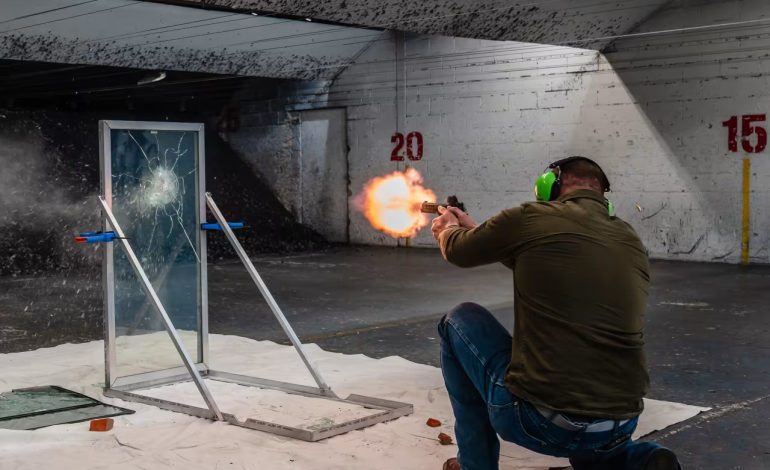Across the US, school districts have spent millions of dollars on window films intended to protect students from armed attackers, the Wall Street Journal reports.
These films, marketed as a barrier against bullets, are installed on school windows with the promise of enhancing security. However, a closer look reveals that these products often fail to live up to their claims, raising concerns about their efficacy in real-world situations.
One of the most widespread products is a polyester-based window film that is thinner than a credit card and is applied to glass doors and windows. Sales representatives often demonstrate the films by shooting at glass panes in controlled settings, which can give the impression that the product can stop bullets. In some cases, these demonstrations mislead officials into thinking the films provide more protection than they actually do. Ryan Wilcox, a Republican state lawmaker in Utah, witnessed such a demonstration, only to see the bullet pass straight through the film-coated glass, effectively failing in front of everyone present.
Despite such failures, some manufacturers and dealers continue to market these films as a bullet-resistant solution, even though major manufacturers like 3M clarify that their films cannot stop bullets or prevent intruders. Nevertheless, window-film dealers have capitalized on false or exaggerated claims of ballistic protection. A recent report by The Wall Street Journal revealed that over $100 million has been spent on these films by school districts across the nation. In many cases, the window film is favored due to its significantly lower cost compared to bulletproof glass, making it an appealing option for budget-conscious districts.
The growing demand for these security measures is partly driven by new state mandates in places like Utah and Texas, which require schools to install window-security measures, either with window film or bulletproof glass. Tennessee now mandates window film at all new or remodeled schools. These laws have led to a boom in the window-film business, with many dealers offering live demonstrations of their products to school officials.
However, experts have warned that these demonstrations are often misleading. Darrell Smith, executive director of the International Window Film Association, stated that some dealers use low-powered guns and outdated glass to create the illusion that their product can stop bullets. Joseph Hendry, a school-safety consultant, highlighted that many school officials are vulnerable to such deceptive sales tactics because they often lack a background in security, making it difficult to assess the true capabilities of these products.
Despite these concerns, many school districts, fearing the worst, have gone ahead with purchasing and installing window films. For instance, the superintendent of a Washington state school district recently spent $1.45 million to install window film at all of its campuses, while other districts, like Dallas Independent School District, have allocated millions for similar measures.
The manufacturers themselves do not claim that their films are bulletproof. Avery Dennison, for example, makes no assertions that their films are bullet-resistant. Nevertheless, some dealers continue to market their products as capable of slowing down attackers and buying time for law enforcement to respond, even though the films do not meet ballistic standards.
In fact, some states have already begun to change their laws in response to the growing awareness of the limitations of these films. In Tennessee, lawmakers removed the term “bullet-resistant film” from state legislation after learning that no such product exists. Questions have been raised about whether schools can seek legal recourse against contractors who have sold these ineffective films, especially when public funds are involved.
In addition to window films, companies like Safe Haven Defense have tried to position their products as bulletproof solutions, using dramatic demonstrations to sell their films. However, experts have pointed out that these products, which often use thicker glass than what most schools have, can give a false impression of the film’s effectiveness.
While window films can offer some benefits, such as reducing entry times and providing some level of protection against minor threats, they are not a foolproof solution to stop an armed intruder. Window-film dealers argue that their products can still play a role in delaying an attacker, buying crucial time for help to arrive. However, many experts stress that schools should be cautious about relying too heavily on these films as a primary means of defense.









